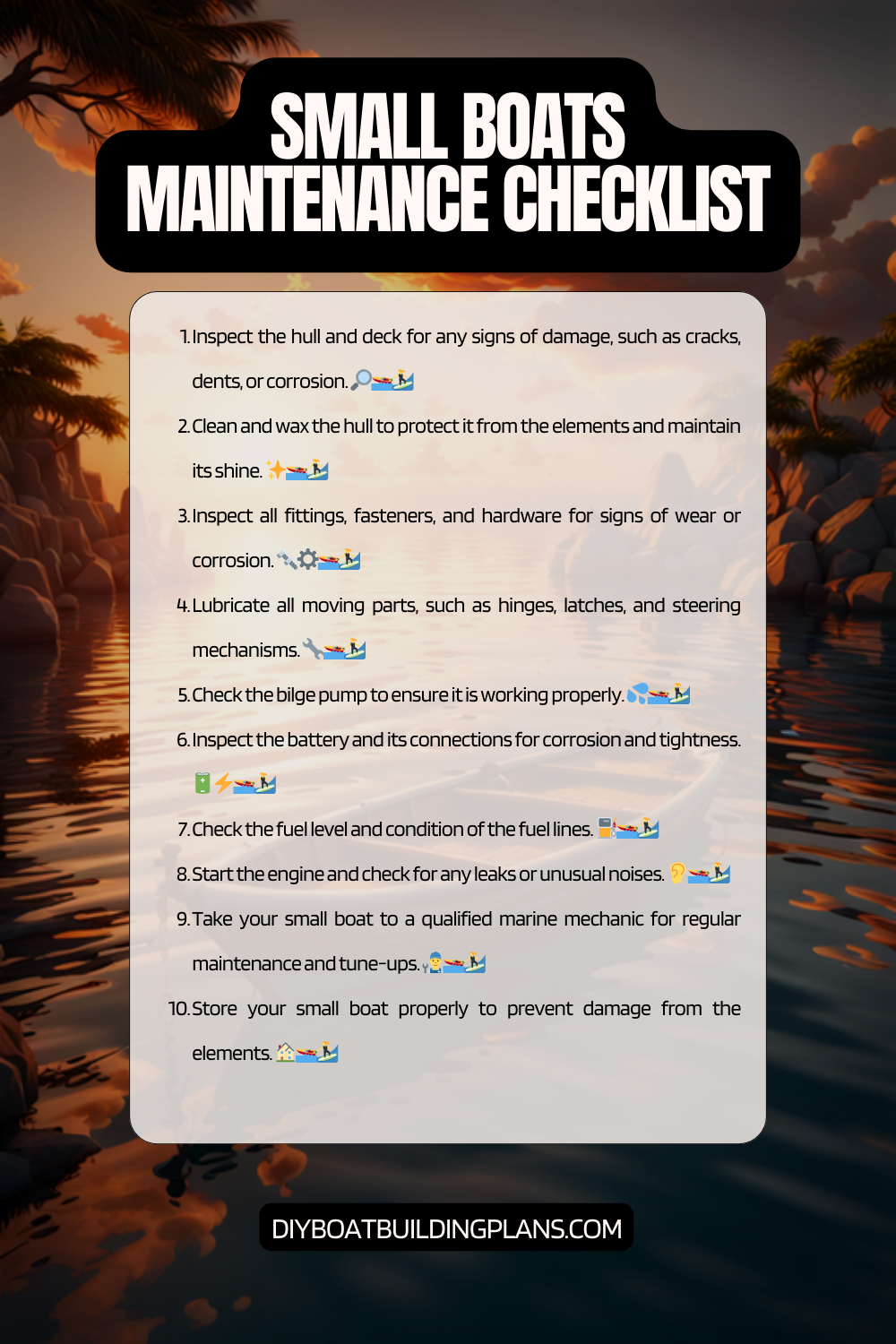Overview of Small Boat Maintenance Tips
Maintaining a small boat is crucial for ensuring its optimal performance and longevity. Whether you use your boat for fishing, leisurely cruises, or water sports, regular maintenance is essential to keep it in top condition. In this comprehensive guide, we will explore the different areas of small boat maintenance and provide you with valuable tips and techniques to help you take care of your vessel.
Key Takeaways
- Regular maintenance is crucial for small boats to ensure safety and longevity.
- Essential tools and equipment for small boat maintenance include a screwdriver, pliers, wrenches, and a multimeter.
- Cleaning and polishing tips for small boats include using a mild soap and water, avoiding abrasive cleaners, and using a marine-grade wax.
- Engine maintenance and troubleshooting for small boats involve checking oil levels, inspecting belts and hoses, and addressing any unusual noises or vibrations.
- Winterization tips for small boats include draining all water from the engine and plumbing systems, adding antifreeze, and storing the boat in a dry, covered area.

Importance of Regular Maintenance for Small Boats
Regular maintenance offers numerous benefits for small boats. Firstly, it improves the overall performance of the vessel. By keeping the engine, electrical system, and other components in good working order, you can expect better fuel efficiency, smoother operation, and enhanced maneuverability. Additionally, regular maintenance helps extend the lifespan of your boat. By addressing minor issues promptly and conducting routine inspections, you can prevent major breakdowns and costly repairs down the line.
Neglecting maintenance can have serious consequences for small boats. Ignoring regular upkeep can lead to a decline in performance, decreased fuel efficiency, and even safety hazards. For example, failing to maintain the engine can result in overheating or mechanical failures while out on the water. Neglected electrical systems may cause electrical fires or other dangerous malfunctions. By neglecting maintenance, you not only risk expensive repairs but also compromise the safety of yourself and your passengers.
Essential Tools and Equipment for Small Boat Maintenance
To effectively maintain your small boat, it is important to have the necessary tools and equipment on hand. Here are some essential items you should have in your toolkit:
1. Screwdrivers: A set of screwdrivers with various sizes and types will come in handy for removing and tightening screws on different parts of your boat.
2. Wrenches: Adjustable wrenches and socket wrenches are essential for loosening or tightening nuts and bolts on your boat’s engine, trailer, or other components.
3. Pliers: Pliers are versatile tools that can be used for gripping, cutting wires, or removing stubborn parts.
4. Multimeter: A multimeter is essential for troubleshooting electrical issues on your boat. It helps you measure voltage, resistance, and continuity.
5. Oil Extractor: An oil extractor makes changing the engine oil a breeze. It allows you to remove old oil without the mess and hassle of traditional draining methods.
6. Cleaning Supplies: A variety of cleaning supplies, including brushes, sponges, and boat-specific cleaning products, are necessary for keeping your boat’s surfaces clean and free from dirt, grime, and saltwater residue.
Having these tools readily available will enable you to perform basic maintenance tasks and address minor issues that may arise during your boating adventures.
Cleaning and Polishing Tips for Small Boats
| Cleaning | Removing dirt, grime, and stains from the boat’s surface using soap and water or specialized cleaning products. |
| Polishing | Applying a polish or wax to the boat’s surface to restore shine and protect against UV rays and other environmental factors. |
| Frequency | Regular cleaning and polishing is recommended to maintain the boat’s appearance and prevent damage to the surface. |
| Tools | Common tools used for cleaning and polishing small boats include sponges, brushes, microfiber cloths, and polishing pads. |
| Techniques | Proper techniques for cleaning and polishing include working in small sections, using circular motions, and avoiding abrasive materials that can scratch the surface. |
Keeping your small boat clean and polished not only enhances its appearance but also protects it from the damaging effects of the elements. Here is a step-by-step guide to cleaning and polishing your small boat:
1. Rinse: Start by rinsing your boat with fresh water to remove any loose dirt or debris.
2. Soap and Scrub: Use a boat-specific cleaning solution and a soft brush or sponge to scrub the surfaces of your boat. Pay special attention to areas prone to dirt buildup, such as the hull and deck.
3. Rinse Again: After scrubbing, rinse off the soap thoroughly with fresh water.
4. Dry: Use a clean microfiber cloth or chamois to dry your boat completely. This helps prevent water spots and streaks.
5. Apply Wax: Once your boat is dry, apply a high-quality marine wax using a soft cloth or applicator pad. Follow the manufacturer’s instructions for best results.
6. Buff: After allowing the wax to dry, use a clean cloth or buffer to buff the waxed surfaces to a high shine.
Regular cleaning and polishing will not only keep your boat looking great but also protect it from the damaging effects of UV rays, saltwater, and other environmental factors.
Engine Maintenance and Troubleshooting for Small Boats
Proper engine maintenance is crucial for the reliable operation of your small boat. Here are some basic engine maintenance tasks you should perform regularly:
1. Oil Changes: Regularly change the engine oil and replace the oil filter as recommended by the manufacturer. This helps keep the engine running smoothly and prevents premature wear.
2. Fuel System Maintenance: Inspect and clean the fuel filters regularly to ensure proper fuel flow. Additionally, use a fuel stabilizer to prevent fuel degradation during periods of inactivity.
3. Cooling System Maintenance: Check the coolant level and inspect hoses for any signs of leaks or damage. Clean the raw water strainer to prevent clogs.
4. Spark Plug Inspection: Regularly inspect and clean or replace spark plugs as needed. Faulty spark plugs can lead to poor engine performance and reduced fuel efficiency.
When troubleshooting engine problems, start by checking for common issues such as loose connections, clogged filters, or worn-out parts. Consult your boat’s manual or seek professional assistance if you encounter more complex issues.
Electrical System Maintenance for Small Boats
The electrical system is an integral part of any small boat, powering various components such as lights, navigation systems, and pumps. Here are some tips for maintaining and troubleshooting your boat’s electrical system:
1. Battery Maintenance: Regularly inspect the battery terminals for corrosion and clean them if necessary. Check the battery’s water level (if applicable) and ensure it is properly charged.
2. Wiring Inspection: Inspect all wiring connections for signs of wear, corrosion, or loose connections. Repair or replace any damaged wires or connectors.
3. Fuse Replacement: Check all fuses in your boat’s electrical system and replace any blown fuses. This helps protect your electrical components from damage caused by electrical surges.
4. Grounding System: Ensure that your boat’s grounding system is intact and properly connected. A faulty grounding system can cause electrical malfunctions and safety hazards.
If you encounter electrical issues that you are unable to resolve, it is recommended to consult a professional electrician or marine technician to ensure proper diagnosis and repair.
Hull Maintenance and Repair for Small Boats
The hull of your small boat requires regular maintenance to keep it in good condition. Here are some tasks you should perform:
1. Cleaning: Regularly clean the hull to remove dirt, algae, and other debris. Use a boat-specific hull cleaner and a soft brush or sponge to avoid damaging the gel coat.
2. Waxing: Apply a high-quality marine wax to the hull after cleaning and drying. This helps protect the gel coat from UV rays and prevents oxidation.
3. Gel Coat Repair: If you notice any scratches or chips in the gel coat, repair them promptly to prevent further damage. Use a gel coat repair kit and follow the manufacturer’s instructions.
4. Anti-fouling Paint: If your boat is kept in the water for extended periods, consider applying anti-fouling paint to the hull. This helps prevent the growth of barnacles and other marine organisms.
Regular hull maintenance not only keeps your boat looking great but also helps maintain its performance and fuel efficiency.
Propeller Maintenance and Replacement for Small Boats
The propeller is a critical component of your small boat’s propulsion system. Here are some tips for maintaining and replacing your boat’s propeller:
1. Inspection: Regularly inspect the propeller for any signs of damage, such as dings, cracks, or bent blades. Address any issues promptly to prevent further damage or performance issues.
2. Cleaning: Clean the propeller regularly to remove any debris or marine growth. Use a soft brush or sponge and boat-specific cleaning products.
3. Lubrication: Apply a marine-grade lubricant to the propeller shaft and other moving parts to prevent corrosion and ensure smooth operation.
4. Replacement: If your propeller is severely damaged or worn out, it may need to be replaced. Consult your boat’s manual or seek professional advice to ensure you choose the correct propeller for your boat’s specifications.
Regular propeller maintenance and timely replacement when necessary will help maintain your boat’s performance and prevent potential issues while out on the water.
Trailer Maintenance for Small Boats
Proper trailer maintenance is essential for safely transporting your small boat. Here are some tasks you should perform regularly:
1. Tire Inspection: Regularly check the tire pressure, tread wear, and overall condition of your trailer tires. Replace any worn-out or damaged tires promptly.
2. Bearing Maintenance: Grease the trailer bearings regularly to ensure smooth operation and prevent overheating. Inspect the bearings for signs of wear or damage and replace them as needed.
3. Brake Inspection: If your trailer is equipped with brakes, inspect them regularly for proper operation and wear. Adjust or replace brake pads as necessary.
4. Lights and Wiring: Check all trailer lights and wiring connections to ensure they are functioning properly. Repair or replace any faulty lights or wiring.
Proper trailer maintenance not only ensures the safe transportation of your small boat but also helps prevent accidents and breakdowns on the road.
Download over 500 Boat Plans. Click on the link below.
-->Click Here<--
Winterization Tips for Small Boats
Winterization is crucial for small boats that will be stored during the colder months. Here are some steps to winterize your boat:
1. Engine Preparation: Change the engine oil and filter, fog the engine with a fogging oil, and add a fuel stabilizer to prevent fuel degradation during storage.
2. Cooling System: Drain the cooling system and add antifreeze as recommended by the manufacturer to prevent freezing and damage to the engine block.
3. Battery Maintenance: Remove the battery from the boat and store it in a cool, dry place. Charge it periodically to maintain its charge level.
4. Water Systems: Drain all water systems, including freshwater tanks, sinks, and toilets, to prevent freezing and damage.
5. Covering: Use a high-quality boat cover or shrink wrap to protect your boat from the elements during storage.
By properly winterizing your small boat, you can ensure that it remains in good condition and is ready for use when the warmer months return.
Small Boat Maintenance Checklist

Conclusion – Small Boat Maintenance Tips
Regular maintenance is essential for keeping your small boat in top condition. By following the tips and techniques outlined in this guide, you can improve performance, extend the lifespan of your boat, and ensure the safety of yourself and your passengers. Remember to perform regular inspections, address minor issues promptly, and seek professional assistance when needed. With proper maintenance, your small boat will provide you with years of enjoyment on the water.
FAQs – Small Boat Maintenance Tips
What are small boats?
Small boats are watercraft that are typically less than 26 feet in length and are used for recreational purposes such as fishing, cruising, and water sports.
Why is maintenance important for small boats?
Maintenance is important for small boats to ensure their safety, reliability, and longevity. Regular maintenance can prevent breakdowns, reduce repair costs, and extend the life of the boat.
What are some common small boat maintenance tasks?
Common small boat maintenance tasks include cleaning the boat, checking and changing the oil, inspecting the propeller, checking the battery, and inspecting the hull for damage.
How often should small boats be maintained?
Small boats should be maintained on a regular basis, typically before and after each use. It is also recommended to have the boat professionally serviced at least once a year.
What are some tips for cleaning a small boat?
Tips for cleaning a small boat include using a mild soap and water solution, avoiding abrasive cleaners, using a soft-bristled brush, and rinsing the boat thoroughly with fresh water after cleaning.
How can I prevent corrosion on my small boat?
To prevent corrosion on a small boat, it is important to keep the boat clean and dry, use a corrosion inhibitor on metal parts, and avoid leaving the boat in saltwater for extended periods of time.
What should I do if I notice damage to my small boat?
If you notice damage to your small boat, it is important to address it as soon as possible to prevent further damage. Depending on the severity of the damage, you may need to repair it yourself or take it to a professional for repairs.



